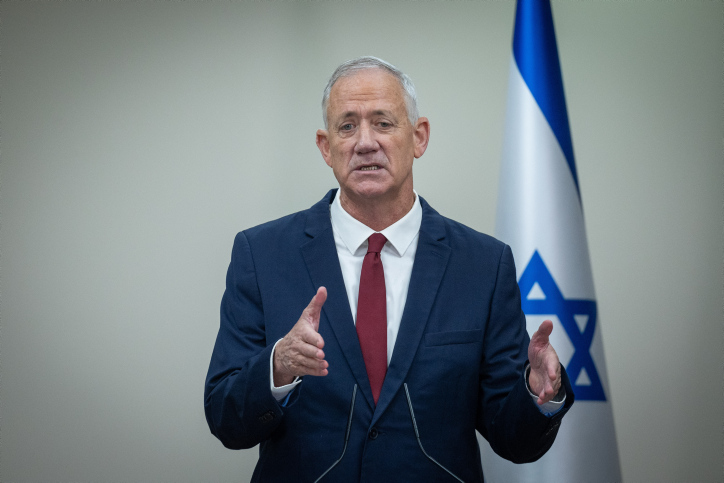Smotrich: ‘Leftist’ Herzog can’t act as fair mediator in judicial overhaul talks
Far-right minister says president ‘100% aligned with the left’; Gantz: Herzog working day and night to prevent ‘destruction of democracy’

Finance Minister Bezalel Smotrich branded President Isaac Herzog a “leftist” on Tuesday, charging that the president was therefore unable to act as an unbiased mediator in talks for a potential compromise on judicial reform.
“I remind you that the president published his outline [for judicial reform] unilaterally. He is 100 percent aligned with the left. The president is a leftist, and unfortunately he is failing to be a fair mediator,” the far-right Smotrich told ultra-Orthodox radio station Kol BaRama, referring to Herzog’s quickly rejected proposal made in March, ahead of the start of the compromise talks overseen by the president.
“I thought that going into the talks at the President’s Residence was not democratically correct — there is a Knesset. The very fact that they took the discussion out of the parliament is an undemocratic decision. At the same time, we came with an open mind but found that there was no partner,” he said.
MK Benny Gantz, leader of the center-right National Unity opposition party, responded that Herzog was working to prevent the “destruction of democracy” that Smotrich was promoting with the overhaul.
“The president of the country is working night and day to prevent the destruction of democracy, the rift in the nation and severe damage to Israel’s economy,” Gantz said in a statement. “The ministers of the government would do well to stop the severe harm to the citizens of Israel that they are inflicting in the regime coup, instead of blaming those who are doing everything to prevent it.”
Another response to Smotrich was issued by MK Yitzhak Kroizer of the far-right Otzma Yehudit party.
“One can support the judicial reform or oppose it. But what is certain is that the president is not part of that equation, President Herzog is a man of many virtues and the State of Israel is important to him,” Kroizer tweeted.
Smotrich made the comments a day after Prime Minister Benjamin Netanyahu’s hardline coalition announced that it would unilaterally advance legislation to curtail judicial review of the “reasonableness” of government decisions before the Knesset ends its session next month, a central element of its controversial judicial overhaul.

In response to the coalition’s announcement, Herzog released a statement saying that “no binding drafts were sent by the President’s Residence to either side, and of course no full agreement was reached on any issue.”
“Naturally, ideas have been raised both in internal discussions and among the general public regarding the issues on the agenda, but they have not yet been formulated into any understandings and conclusions,” Herzog said.
Herzog also called on parties to return to the negotiating table, despite the red lines set and crossed among them.
“I have always believed, today more than ever, that dialogue is the best solution for the State of Israel. I reiterate my call to show national responsibility and to continue the fruitful and substantive dialogue that took place in recent months under the auspices of the President’s Residence,” he said.

The coalition leaders’ decision to advance the legislation likely sounded a death knell for the stalled talks hosted by Herzog to work toward a consensus solution.
Shortly before the coalition announced its plans, opposition party heads stressed that unilateral legislation would be the end of the negotiations, which have been frozen since last week when the coalition maneuvered the voting on a key judicial panel so that the committee to select judges will not be convened in the immediate future despite a backlog of necessary appointments.
Lapid and Gantz, who pulled out of talks last Wednesday and said they’d stay away until the Judicial Selection Committee is convened, denied that Yesh Atid and National Unity came to agreements in principle over reasonableness and a second issue that Netanyahu is weighing unilaterally pushing — the appointment of private legal advisers to ministries.

Legislation to take political control of judicial appointments — the core and most controversial element of the overhaul — will be scheduled for the winter session, which opens in October, according to several coalition sources. The coalition is expected to withdraw the bill it was ready to enact in late March, which would give the governing majority near-absolute control of appointments throughout the judicial hierarchy. Instead it is expected to prepare a fresh draft with as-yet unspecified changes.
Announcing that coalition heads “reached a decision to continue the reform,” Smotrich said Monday that he had “instructed” Constitution Law and Justice Committee head Simcha Rothman to begin advancing a bill as early as Wednesday to end the High Court of Justice’s ability to review government decisions for their reasonableness.









